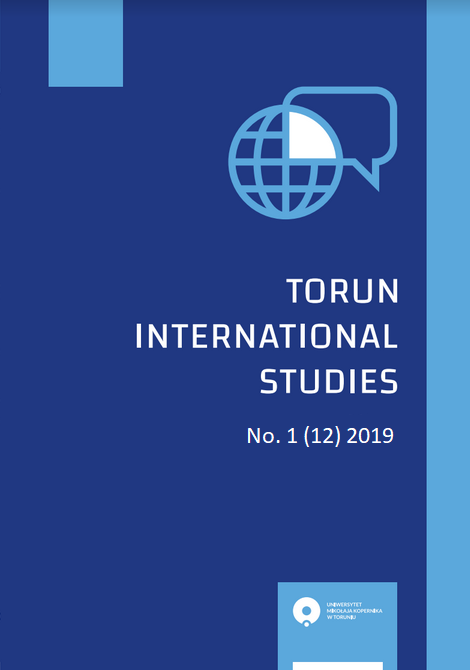BETWEEN POLITICAL APATHY AND POLITICAL PASSIVITY. THE CASE OF MODERN RUSSIAN SOCJETY
DOI:
https://doi.org/10.12775/TIS.2019.007Keywords
political absenteeism, political apathy, social anomy, civic passivity, Russian societyAbstract
It is difficult to characterize the Russian society as completely active or passive due to the high voter turnout, but simultaneously, a low level of involvement in political life. The research focuses on determining the extent of activity/passivity of the Russian society in the years 2000 – 2012. Results of the analysis revealed a degree of participation of the Russian citizens in the electoral decision-making process and their involvement in political life. It was answered to the question: to what extent Russian legislation allows society to participate in the political life, by estimating a political activity index (Wap(ap)). Additionally, the political activity correlate index (Wap(k)) was checked, that enable to correct the obtained result on the basis of legal provisions according to the real dimension of the Russian political activity.
References
Baudrillard, J. (1983). In the Shadow of the Silent Majorities. New York: Semiotext(e).
Central Election Commission of the Russian Federation. Retrieved October 10, 2019, from http://www.cikrf.ru/
Constitution of the Russian Federation (1993) (passed by nation-wide voting of December 12, 1993) (with the Amendments of December 30, 2008, February 5, July 21, 2014).
Dahl, R. (1995). Demokracja i jej krytycy. Kraków: Znak.
Della Porta, D., & Kreating, M. (2008). Approaches and methodologies the social sciences. A Pluralist Perspective. Cambridge-United Kingdom: Cambridge University Press.
DeLuca, T. (1995). The Two Faces of Political Apathy. Philadelphia: Temple University Press.
Federal Constitutional Law. (1995). No. 2-FKZ of 10 October 1995 On the Referendum of the Russian Federation.
Federal Constitutional Law. (2004). No. 5-FKZ of 28 June 2004 On the Referendum of the Russian Federation.
Federal Law. (1997). No. 124-FZ of September 19, 1997 On Basic Guarantees of Electoral Rights and the Right of Citizens of the Russian Federation to Participate in a Referendum.
Federal Law. (2002). No. 175-FZ of December 20, 2002 On the Election of Deputies of the State Duma of the Federal Assembly of the Russian Federation.
Federal Law. (2005). No. 51-FZ of May 18, 2005 On the Election of Deputies of the State Duma of the Federal Assembly of the Russian Federation.
Federal Law. (2002). No. 67-FZ of June 12, 2002 On Basic Guarantees of Electoral Rights and the Right of Citizens of the Russian Federation to Participate in a Referendum, (as amended on September 27, December 24, 2002; June 23, July 4, 2003).
Federal Law. (1995). No. 82-FZ of May 19, 1995 On Public Associations.
Federal Law. (2001). No. 95-FZ of June 21, 2001 On Political Parties.
Finifter, A.W. (1970). Dimensions of political alienation. American Political Science Review, 2 (64). pp. 389–410.
Kaźmierczak, T. (2011). Partycypacja publiczna: pojęcie ramy teoretyczne. In A. Olech (Ed.), Partycypacja publiczna. O uczestnictwie obywateli w życiu wspólnoty lokalnej (pp. 83–99). Warszawa: Instytut Spraw Publicznych.
Korzeniowski, K. (1993). Alienacja polityczna a uczestnictwo polityczne. In J. Reykowski (Ed.), Wartości i podstawy Polaków a zmiany systemowe. Szkice z psychologii politycznej (pp. 155–192). Warszawa: Wydawnictwo Instytutu Psychologii PAN.
Korzeniowski, K. (1999). Między rewolucją a normalnością. Rzecz o alienacji politycznej. In B. Wójciszke, & M. Jarymowicz (Eds.), Psychologia rozumienia zjawisk społecznych (pp. 61–78). Warszawa–Łódź: PWN.
Levada Centr. (2010). Retrieved October 13, 2019, from https://gtmarket.ru/news/2010/06/25/6247.
Lipset, S.M. (1998). Homo politicus. Społeczne podstawy polityki, Warszawa: PWN.
Long, S. (1976). Political alienation among Black and white adolescents: a test of the social and political reality model. American Politics Quaterly. 4. pp. 267–268.
Lubecki, J., & Szczegóła, L. (2007). O źródłach apatii politycznej w transformującym się społeczeństwie. In J. Garlicki (Ed.), Społeczne uwarunkowania transformacji systemowej w Polsce (pp. 74–92). Warszawa: Dom Wydawniczy Elipsa.
Marsh, M., O’Toole, T. & Jones, S. (2007). Young people and politics in the UK Apathy or alienation. New York: Palgrave Macmillan.
Meleshevich, A. (2007). Party systems in post–soviet countries a comparative study of political institutionalization in the baltic states, Russia, and Ukraine. New York: Palgrave.
Michalak, B. (2013). Mieszane systemy wyborcze. Cele. Rozwiązania. Konsekwencje. Toruń.
Mider, D. (2013). Partycypacja polityczna a legitymizacja systemu politycznego. Studia Politologiczne. 18, pp. 12–30.
CSCSNS. (n.a.) Monitoring the Status of Civil Society, HSE Centre for Studies of Civil Society and Nonprofit Sector. Retrieved October 13, 2019, from http://www.hse.ru/monitoring/mcs/ustmcs.
Prokop, M. (2016). Hybridity of Ukrainian Society in the years 2000 – 2012. Between Political Activity and Political Apathy, Kultura i Edukacja. 4 (114), pp. 150–161.
The Foundation for Civil Society Development [Fond razvitiya grazhdanskogo obshchestva], Doklad Rossiyskaya partiynaya sistema: tekushcheye sostoyaniye i perspektivy razvitiya. Retrieved October 10, 2019, from http://civilfund.ru/mat/view/42.
Kuleba, O. (2010). Politychna uchast’: sut’, riznovydy ta osoblyvosti. Ukrayins’Ka natsional’na ideya: realiyi taperspektyvy rozvytku. Vypusk 22. pp. 65–69.
Nekhaychuk, Yu. (2012). Grazhdanskaya aktivnost’na karte Rossii. Retrieved October 13, 2019, from http://www.levada.ru/2012/05/30/grazhdanskaya-aktivnost-na-karte-rossii/.
Downloads
Published
How to Cite
Issue
Section
Stats
Number of views and downloads: 904
Number of citations: 0



